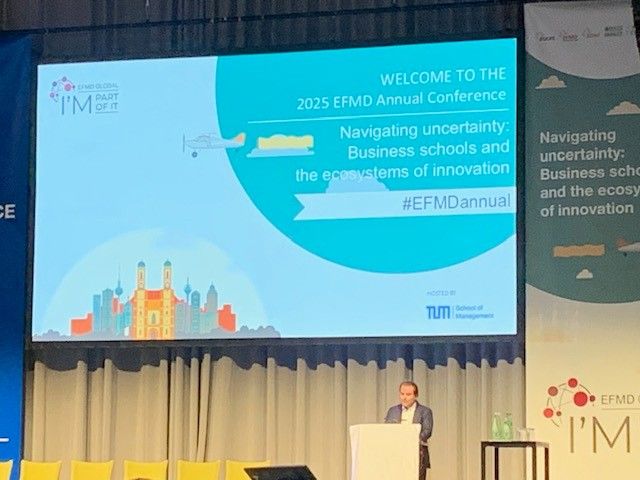Cambridge (Hybrid)
Programme Manager, Custom Programmes
£33,361-£41,474 + Benefits
Business Schools

The beginning of June saw leaders from across the international academic community converge in Munich for the annual EFMD conference to discuss the future of business schools and how we can all navigate the current uncertainty across the globe. And what a great event it certainly proved to be!
We had the opportunity to network with a number like-minded individuals, and the programme of speakers certainly didn’t disappoint. While it would be impossible to delve into every topic and conversation that was covered over the course of the two-day event, there were a few stand-outs that have certainly got us all thinking.
The impact of the macro-economy on business schools
One of the sessions, hosted by Professor Rebecca Henderson, left myself and other attendees with a lot of thoughts to consider on the future of business schools.
As Professor Henderson highlighted, it is a challenging time for business schools. Most are facing threats from all directions, whether that’s the attack on research, free speech and democratic institutions in general across the pond, or global conflicts, climate change, falling GDP, and, of course, the rise of AI. The news agenda makes for rather dismal reading and Professor Henderson’s closing remarks certainly brought the point to the fore that we are all in a state of flux and facing a “poly-crisis”.
For business schools, this means reshaping perceptions, teachings and, ultimately, the future of corporations and nations. Yes, it’s a tough climate, but we all have a responsibility to react, adapt and change in this environment. As we highlighted in an earlier article, the nature of leadership skills in schools globally will need to evolve and, indeed, we are already seeing this.
However, Professor Henderson highlighted a new level of teaching that needs to be driven across academic teaching as well. Her book, “Reimagining capitalism in a world on fire”, explores many of these concepts in far more detail, but one point that really stood out to me in her keynote was the importance of teaching hope. It’s far too easy to become encompassed by the negativity and pessimism that is surrounding us all, but hope should never be lost.
Future business leaders must be able to encapsulate that hope and turn it into corporate success. But that ability starts in their business school studies, which in turn will require new skills from leadership teams and academics alike.
Innovation is there
One of the other conversations that left a last-impacting on the audience was led by Kameel Khan, a Judge and the visionary behind Project ReMAKE. It’s tough to articulate the sheer scale of the impact that this project has on the lives of individuals with the same passion that Khan perhaps did, but we can certainly try!
For those that haven’t heard of ReMAKE before, it is a programme designed to help ex-offenders (or entrepreneurs as those involved prefer to call them) better integrate back into society by equipping them with the tools and knowledge to get their own business ideas off the ground.
Working in collaboration with universities and schools, the programme organisers connect these entrepreneurs with business and student mentors to help them develop a business idea, turn this into a plan and then present the concept back to industry-relevant professionals for feedback. In essence, it allows every individual to set themselves up to successfully launch a business.
Aside from the scale of innovative thought that should be lauded in this project, it does also demonstrate a prime example of how management education is evolving, and should evolve further in the future. Ethically and morally, Project ReMAKE is a shining example of the responsibility to support under-privileged communities. It also reflects the growing demand and desire from the global population to be involved in action, give back and do more for others, and helps spread the message of hope that Professor Henderson discussed in her session.
However, from a longer-term strategic point of view, it is also aligned with the changing nature of the corporate world. Businesses need to demonstrate their commitment to ESG and CSR initiatives in order to align with consumer, employer and stakeholder expectations. Those tendering for public sector contracts are also increasingly having to demonstrate how they are giving back to society, as are business schools themselves.
What does drive the success of all of this, though, are the right leaders in the management education community who are willing to be bold, make brave decisions and have the moral courage to challenge the norm.
The future of business schools
The EFMD conference may have highlighted a difficult climate ahead, but it also revealed the innovation, creativity and hope that remains and everyone in business education should hold on to for the future. There are exciting times ahead and while that may require new direction, creativity of thought and different skills, it’s certainly something we are looking forward to being involved in.
Looking to expand your business school leadership team or searching for that next opportunity in your career? Contact us today to find out how we can help.